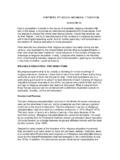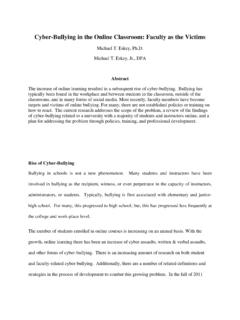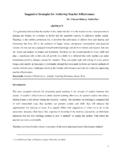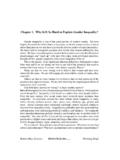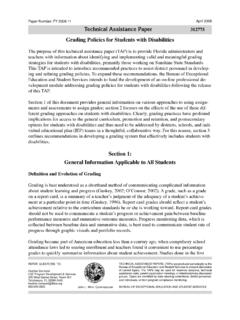Transcription of Chapter 5. Intimate Combat: The Responsibility for …
1 Robert Max JacksonDOWN SO LONG ..Working DraftChapter 5. Intimate Combat: The Responsibility for ChildRearingWomen everywhere raise children. Men everywhere have greater power thanwomen. These fundamental social patterns must be causally linked. But what isthe nature of those links?Both scientific theories and popular culture use women's commitment tochildren to explain and to justify gender inequality. When a couple have childrensomeone must care for them. But we should not take women's Responsibility forchild rearing for must ask why women do most child rearing. Or, even more, we must askwhy men do not. In brief, social opinion, internalized expectations, rationalcalculation, and the imbalance of spouses' resources used in conflicts all thrustthat Responsibility on women.
2 Because women and men are socialized to acceptthe prevalent definition of female and male roles, they anticipate women'sresponsibility for children. They do not contemplate the possibility of otherarrangements that might be preferable. They discredit any signs of deviance inthemselves and others. Should a couple consciously examine the desirability ofthe prevalent division of labor, they quickly recognize that the man's employmentbrings greater income and his career holds greater promise for the future. Shouldthey fight over the issue, the man is in a strategically superior position to rejectresponsibility. His superior employment and the general status of men in societygenerally award him dominance in the family.
3 She is much more vulnerable tosocial reproach for rejecting Responsibility for child social causes of the sexual division of labor do not get wide recogni-tion. Popular beliefs in this and other societies glibly attribute sex differences inbehavior to people's abilities or motives. Women and men (or people of differentraces or the poor and the rich) have divergent fates because they are differentsorts of people. Why are they different? Religions blame (or credit) thefortuitous choice of omnipotent aliens (the will of God). Those who prefer theirmetaphysics grounded in the observable world point to the irrepressible effectsof biology ordained by nature.
4 And when emergent conditions become moreappealing than inherent differences, we come upon references to differences inchildhood indoctrination based on adults' understandings of , the relationship between child rearing and inequality defies anysimple analysis. Regardless of the value of children--emotional or practical--thereCH. 5 CHILD REARING P. 12698 This focus on the Responsibility for child rearing ignores but does not deny thatchildren can bring joys to adults. The emotional bond between parent and child and theexperience of participating in the development of a human personality can bring enormouspleasures.
5 Many parents, and mothers in particular, would claim that the rewards of havingchildren surpass the costs. This is not the issue. Robert Max JacksonDOWN SO LONG ..Working Draftare costs involved in their care and Time spent caring for childrencannot be used for other pursuits. The effort of child tending is effort regardlessof how willingly it is embraced. The question is why women so regularlycontribute most of this Role of BiologyThe Social Explanation of MotheringAn explanation of women's childbearing responsibilities must solve twoproblems. First, it must identify the ongoing social processes that lead womento care for children and destine men for other activities.
6 Second, it must showwhat social structures or social needs produce and sustain these processes. Wecan provisionally specify several social conditions that can direct women towardchild rearing and men away from it: (1) the typical circumstances of childhood development that ensurewomen expect child rearing obligations and accept them as legitimate whilemen do neither, (2) the limitations on women's opportunities to follow other paths in life(and the incentives offered men by such opportunities), (3) sanctions brought to bear on women who do seek and try to pursuealternatives (or on men who aspire to spend their time rearing children), and(4) ideology that supports and legitimizes the allocation of child rearingresponsibility to women (and others to men).
7 Three distinctive social explanations try to account for women's child rearingresponsibility. First, the sex role socialization approach emphasizes the creationof divergent feminine and masculine identities in children. It contends thatparents, teachers, mass media, and the surrounding culture impose differentexpectations on girls and boys. Second, the psychoanalytic-functionalistapproach emphasizes the creation of different male and female personalities thatmake women a better choice for rearing children. This approach assumes menand women acquire different personality profiles because their early emotionalrelationships with parents differ.
8 Social processes within families and otherinstitutions then direct both sexes toward the roles fitting their , the power and conflict approach argues that women accept responsibilityCH. 5 CHILD REARING P. 12799 Weitzman Max JacksonDOWN SO LONG ..Working Draftfor child rearing because they have no choice. Men have higher status andpolitical ascendancy and they use their power to keep women at home. We wantto consider each of these Role SocializationEvery society has culturally defined sex roles. These roles attribute differentways of thinking and acting to men and women. They also associate differentsocial obligations and privileges with men and women.
9 In societies like our own,women have been expected to be passive, nurturing, deferent to men, andcommitted to child rearing. Men have been expected to be assertive, controlled,authoritative, and committed to providing income through men and women conform to these expectations without consciousconsideration of alternatives. If forced to assess them, most people would claimthat the role expectations are natural and , two well-known characteristics of sex roles suggest a paradox. First, thespecific definition of what is feminine or masculine varies widely across , within any culture most people believe their particular gender identitiesare natural, necessary, and appropriate.
10 How can people everywhere believe thattheir peculiar definition of male and female characteristics in an obvious,unavoidable reflection of nature?Socialization makes sense of this apparent paradox. As people everywhereare inherently the same biologically and psychologically, some process must givethem the gender identities characteristic of their society. And this process mustmake that identity seem INFLUENCESSex role socialization refers to the ways families, schools, and the surround-ing culture indoctrinate children so they act out masculine and feminine rolesthrough the remainder of their According to sex role socialization theory,adults benignly teach gender roles by differentially rewarding (or punishing)gender appropriate (or inappropriate) behavior.
